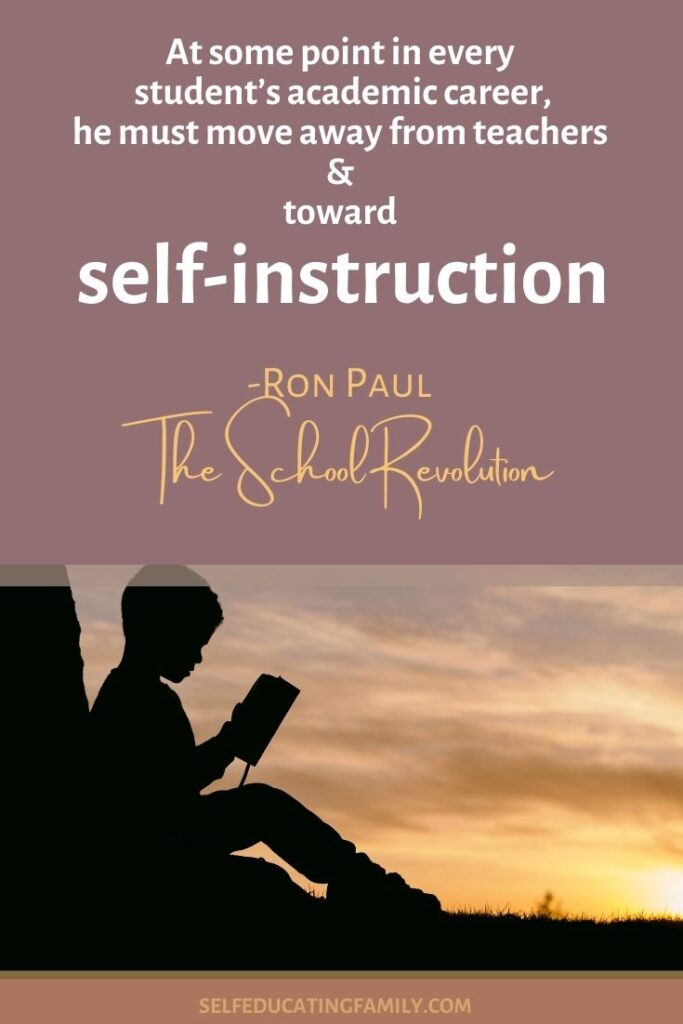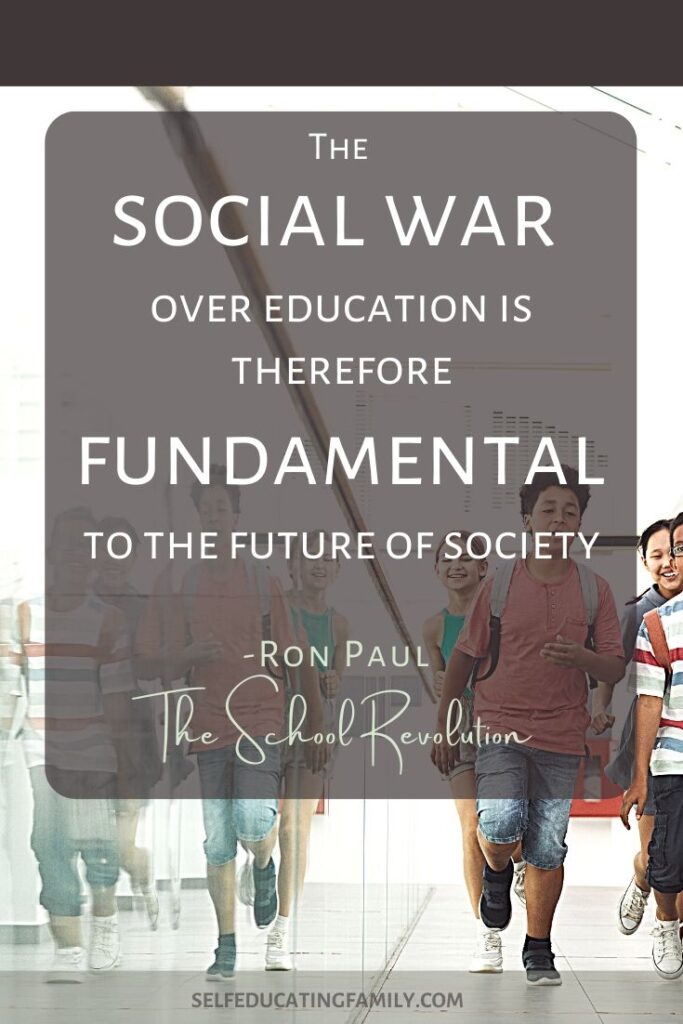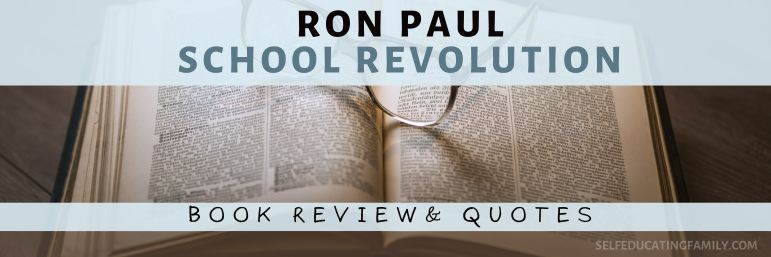Thoughts from School Revolution by Ron Paul
While reading School Revolution by Ron Paul, I’ve been making notes of the ideas that are really striking, and this post shares them with you. Note that this book was written in 2012, but it still points to how changes need to be made.
Disclosure: This post contains affiliate links, meaning that if you make a purchase after clicking through, SelfEducatingFamily will receive a small commission at no extra cost to you.
Why Read School Revolution?
Ron Paul’s book was written in 2012 – so you might think it’s a bit out of date. But fast forward to today and the need for a change in how we think about educating our young people is all the more urgent, and Ron Paul has some crucial ideas to ponder.
I probably should have read this book before I used the Ron Paul Curriculum to supplement my kids when they hit high school. It’s a definite eye-opener. Check out my son’s review.
What is so revolutionary?
As you may know, I have used a commonplace notebook to collect the thoughts that strike me from the books I read. And I’ve been on a book challenge this year to keep track of my reading. This post is the intersection of my commonplace book and the book challenge. I’ve noted all of the quotes from Ron Paul’s book, The School Revolution, here in this post.
Why Change how schooling works?
“Children who know how to think for themselves spoil the harmony of the collective society which is coming where everyone is interdependent.”
-John Dewey
John Dewey (1859-1952) was an American philosopher and educational reformer. He was influential in the development of our current state-run school system. There’s an interesting essay on his role in an article called The Tragedy of American Education: The Role of John Dewey on The Institute of World Politics.
To me, what is of note is that Dewey was extraordinarily influential for our existing school system.
That quote says that our existing system is designed to make sure your kids don’t think for themselves. That’s not to say it isn’t possible – it just wasn’t set up to make independent thinkers.
Are there any alternatives?
People have kicked around educational theory for a long time. What makes a good education? Just what does it mean to be well-educated? What does a society need to function well? What should its citizens know or be able to do? And what’s the best way to accomplish that?
In many pre-industrial societies, education looked very different from today and looked different depending on who you were. Paul states the obvious – that schooling was controlled by parents for millennia.
In the industrial age, the methods of Charlotte Mason and others of her time, like Uno Cygnaeus, were pushing against the current of producing good workers for the growing industrial society and instead tried to educate the whole person in order to lead richer lives regardless of the work they did in society.
Current homeschooling stems directly from those parents who feel (for whatever reason) that their kids will get a better “education” outside of the mainstream channels. Ron Paul went on to create The Ron Paul Curriculum because of the need in the market.
So alternatives exist and have existed for a long time, but we may be on the cusp of genuine change in today’s world.
So give a moment and think about what you think education should be.
Quotes
All quotes are from The School Revolution by Ron Paul, unless noted.
On Liberty, Education, & Responsibility
“To the extent that any society substitutes a source of authority over education other than the family, it departs from liberty.”
“Liberty is inescapably associated with responsibility.”
“In other words, the story we tell our children with respect to their lives — namely, that as they mature, they will be given greater liberty and greater responsibility— is not the story their textbooks convey to them.”

On reform
“The social war over education is therefore fundamental to the future of society.”
“The battle rests on a fundamental difference of opinion. The statist educators are committed to this principle: parents are not trained nor competent enough to make decisions about their children’s education. Millions of parents disagree.”
Ron Paul: The School Revolution
“Parents worry that they are not capable of teaching their children the basics of reading and writing. The older their children get, the more parents fear they have not been trained to provide a quality education for them.”
“In any call to reform the existing educational system, the cost factor should be front and center.”
More on costs
Ron Paul gets into a great discussion on the hidden costs of state education and the costs of homeschooling in Chapter 4: Family Based Education. And in Chapter 5, Competition in Education, he even gets into some nitty-gritty. Did you know private high schools (2012 reference) had to have 1500 books in their school libraries? But a CD-ROM at a computer station didn’t count even though it had access to 5000 books. Accredited high schools today still have a requirement to have a library, (And I am all for books obviously, but is that requirement the best way to deliver education today? In the days of private tutors, access to books was different. And in the 1800s U.S., when children wrote on slates, literacy rates in New England were as high as 98%. We aren’t exactly meeting that mark today.
On Lecture style learning
“…at least 90% of everything in a lecture is forgotten in less than three weeks. It is almost random as to what information in a lecture is actually retained by the listener. What one listener will retain will be very different from what some other listener will retain.
This is why classroom instruction is a poor substitute for reading.”
On self-education
“At some point in every student’s academic career, he must move away from teachers and toward self-instruction.”




Summary
I really enjoyed the ideas in this book about how to reform our educational system. I enjoyed Ron Paul’s The School Revolution and think it is extremely relevant still today.
Related Articles
In honor of the book I’m reading, I thought I would point you toward some Ron Paul Curriculum related articles:
- Ron Paul Curriculum Review — including from the student perspective
- Unexpected Lessons — guest post from my son who had some tangential learning while taking RPC classes.
- Writing a Kindle Book — both sons wrote Kindle books in the business class
- Thoughts on the University System — an essay written by my son in the 10th grade RPC Western Civilization class
- How to Evaluate Independent Learners — RPC taught my sons to take hold of their own education.
